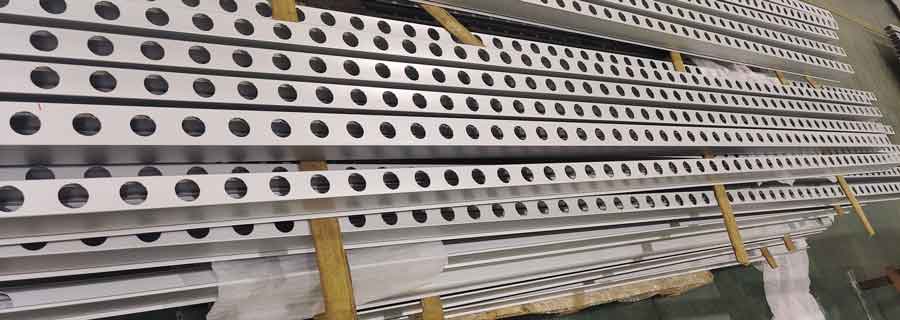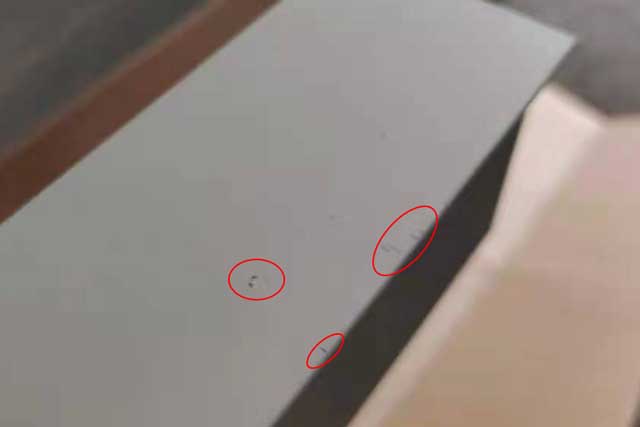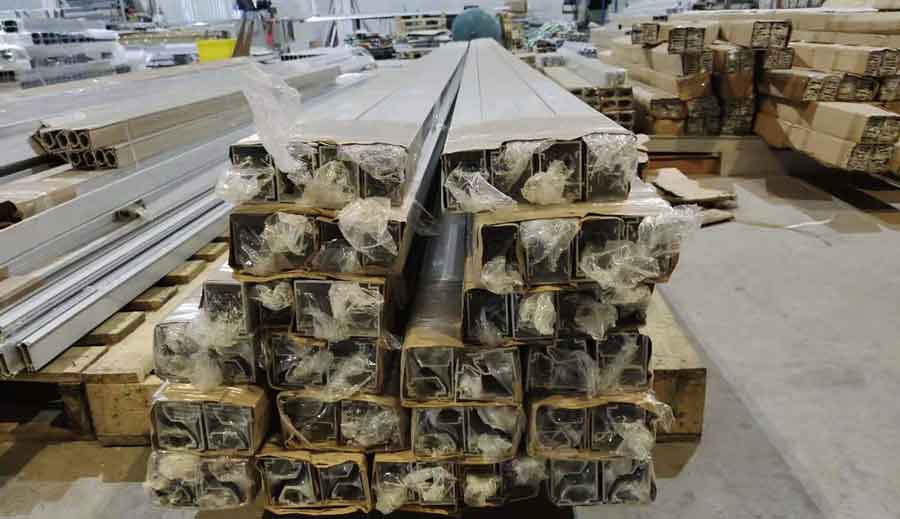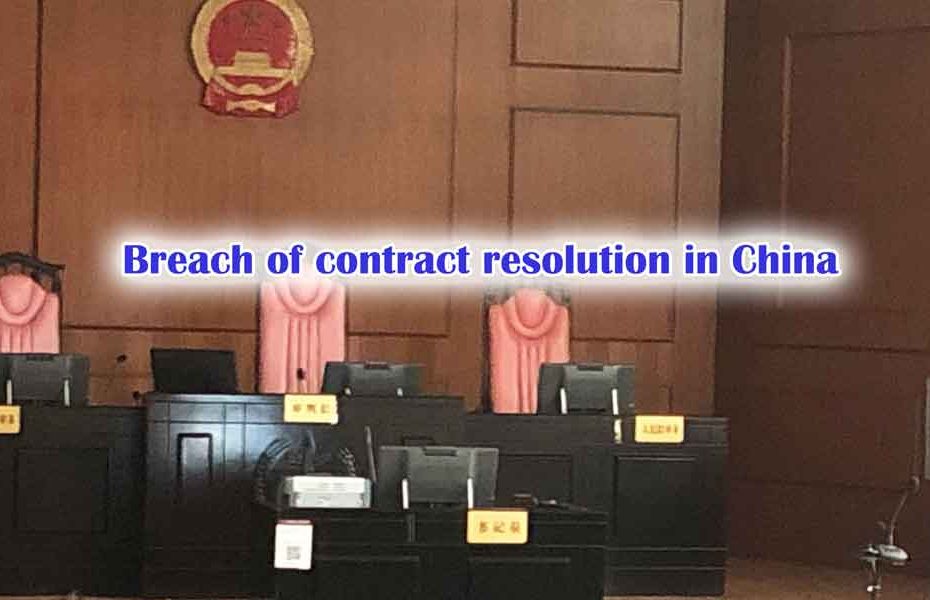If you are an international buyer, resolving contract disputes can be complicated and time-consuming – but don’t be intimidated! This post describes what we have experienced resolving a recent breach of contract dispute and provides insights we learned from the legal system.
A brief description of this breach of contract case
We all want to work with responsible and reliable suppliers, but good luck does not always come with every new choice. This turned out to be the case when we placed an order with a new factory for a machining job of 6 meter-long aluminum profiles.

To cut a long story short, everything seemed good at the beginning: a few samples were made and approved, the sample order had been half-finished, and the factory showed themselves to be responsive and diligent. It all looked like we could begin a good business relationship… until we placed the ‘big order’ with them.
Machining these 6-meter long profiles would be quite a demanding job, because we required that there should be no scratches and other blemishes on the surface (we lowered this standard a little later to make it workable for them). This requirement of the job made it necessary for the factory to check the finished surface very carefully; there were even times that the raw material came with imperfections, so they needed to identify those imperfections prior to machining.

The factory soon lost patience to work on this job. They had received a lot of orders from other customers; they started to put our job aside, and they ignored our repeated request to finish the order on time.

We had earlier agreed to send them the deposit payment to cover the material cost, and due to a miswording in the contract (and although we had a telephone recording of a verbal agreement that they were responsible for the purchasing of the raw materials) they insisted that it was our fault that the raw material had imperfections.
What stood in favor of us is that they did not have any written record of mentioning this matter before the deadline of the order delivery date.
After two months, we chose another supplier to start from scratch. After three months, we started to file a law case against the original factory.
The result of the court hearing
The court hearing started at 9:00 AM and ended at about 1:30 PM, so it was a long process. At first, we all made our utmost efforts to fight for our points of view and provide the judge with our evidence.
Things started to make a dramatic change when the judge started to conduct mediation, when she talked to the two sides separately. When I came back to the courtroom, the other side agreed to pay back about $21,500. Our earlier deposit to them was about $27,500. That meant that taking into consideration the attorney’s fee, our total loss is about $7,500.
Since continuing with a lawsuit is quite time-consuming, we agreed to this mediation.
Although we did not get back all of our losses, we perceived this result to be fair given the ‘best’ and ‘worst case’ scenarios outlined by our lawyer prior to the court hearing.
Here are some of our thoughts or insights for resolving a breach of contract dispute in China:
You can win the case, but you can still lose money
It is not like that if you win the case, you are justified to get the amount of compensation that you expect.
In our opinion, the breaching party should pay an excessive amount as a punishment – since they are faulty. Unfortunately, law does not take it this way. Court judgment usually does not take into full consideration how wrong a faulty party is – and full and just compensation is rarely awarded.
Now, here is an issue: due to inadequate evidence, you (as the purchaser) may be proved partly responsible for breaching the contract (such as through late payment, even if it is really minor)!
Your liquidated damages claim may not be supported by the judge
In many cases, the actual or potential losses of breaching a contract are hard to be determined. This is why you may want to have a fixed damages amount pre-agreed with the supplier in your contract. This called ‘liquidated damages’.
However it is tricky to draft this clause correctly – because the full amount may not be agreed to by the court.
The purpose of liquidated damage is not to be punitive, but rather to be fair. This means the amount of the damage should be as close to the real losses as possible. Otherwise, both parties can request the judge to raise or lower the amount.
In China, it is assumed that you can claim for 130% of the actual losses against the breaching party without much risk of a downward revision of the claim by the courts. In practice, however, you usually put 4 times of the current bank loan interest – for example 0.05% per day as a liquidated damage for a late delivery. This sort of figure will usually be supported by the courts.
However, large liquidated damages can still be supported with solid evidence
It’s not necessarily the case that large claims will never be supported by the judge. Here is an example:
I met a mold maker the other day. He told me that he was a supplier for a large auto manufacturer in China. According to their contract, if this mold maker missed the contract’s deadline, they will be fined hundreds of dollars for each minute of the delay. The total sum could potentially be huge if the delay is a few days – not to mention weeks!
This sort of damage could be supported by a court of law because the auto manufacturer could show the judge the monthly (or yearly) output of their production line. If their production line has shut down due to the failure of supply of quality parts, the supplier should compensate for their loss.
If a large sum of liquidated damages can be proved to be an actual loss, it will still be supported, but this will usually only happen if you are a large company and located in China.
Difficulty in handling a quality dispute
It is quite usual that the buying party wants to refuse to pay or ask for a payment refund due to the poor quality of received products. If you are the buyer, you are normally at risk of losing this dispute.
Regarding claims of non-conformity of products (against pre-agreed criteria), the verification process will be pretty disputable and time-consuming. Judges are not engineers or technicians, and they will usually rely on a third party to verify the quality issues.
It is easier when the dispute centres around a simple fact, like the failure to meet dimensional tolerances (diameters, length, and width; locational and geometrical tolerances). When it comes to more sophisticated and qualitative issues, like visual appearance, coating quality, material properties etc., the verification of fault will be more complicated and more open to dispute.
There are a lot of other issues surrounding the fault verification process itself:
Where should the quality inspection be conducted?
How can you prove the products with quality issues are not produced by other manufacturers (subcontracted)?
What percentage of the product should be inspected?
The whole process will be long and convoluted. This does not mean that you can not win the dispute – but if possible, try to avoid quality issues in lawsuits. It is a lot easier to sue on other contract violations, like delayed delivery or payment issues.
Court judge or mediation?
In many cases, court mediation is an easier and time-saving solution for both parties. Unlike private mediation or negotiation, court mediation has just the same legal force as a court judgment – so don’t get confused by the word “mediation”!
The differences between court judgment and mediation are:
The court mediation is final, you cannot appeal on it later. This means once you agree on it, you are not allowed to change your mind.
The court mediation does not require solid proof – it is based on the acceptance by both the plaintiff and defendant.
The court judge does not need to take responsibility for the content of the mediation – because again, it is agreed and accepted by both parties. That is why judges like mediation.
Court fees for mediation are around 50% of the charges for court judgments.
The content of the mediation will not be posted on any official website, and this helps to maintain the reputation of the losing party.
Here are our three pieces of advice for international buyers on how to deal with a breach of a contract dispute – or, better, of how to avoid this dispute in the first place:
Keep the proofs, -the contract is the most important one!
You may be keen to express your anger at the other party – but court judges are not driven by emotion: they will only make the judgment based on the evidence.
Legal evidence includes the contract, purchase orders, emails, chat records, or even telephone recordings.
Among these, contracts or purchase orders come at the top of the list of legal proof. Make sure you define things clearly: quality inspection criteria, delivery date, payment terms, shipment, packaging, when the ownership of goods will transfer, etc.
Keep everything documented! This will show your supplier that you are a professional buyer, and they will be at risk if they violate the contract.
Hire an attorney, if possible
If you do not know how to draft a well-written contract, hire a lawyer to do so – or to review your contract. This is a good way to do it because it will not cost as much as drafting a contract from scratch, but it is definitely helpful.
Take actions decisively, don't wait until things get worse
After reading this post, I hope you already have an idea of what to expect when taking legal action following perceived supplier fault. One lesson we have learned during our legal experience is: action taken earlier is always better than action taken later.
There is a legal term called anticipatory repudiation – meaning even before the contract deadline, if you foresee that the supplier will not be able to finish the order on time, you are entitled to sue them.
